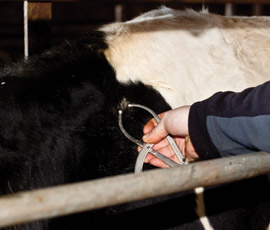Badger cull delay is right, say farm groups

Proceeding with a badger cull this autumn would have been irresponsible and done the industry no favours, farm leaders and vets have agreed.
The major farming organisations have given their backing to the decision to postpone the cull, despite acknowledging the frustration it will cause farmers.
Harry Cotterell, president of the Country Land and Business Association, said it was regrettable a series of factors had conspired to make the cull impossible this year.
But he added: “It would be irresponsible to press on with the trials if the required 70% cull target cannot be met within the remaining time available.
“It is vital the cull happens next year and we back the secretary of state’s absolute commitment to going ahead with the trials then as part of the government’s programme of measures to fight the terrible scourge of bovine TB.”
Peter Jones, president of the British Veterinary Association, agreed it was the responsible thing to postpone the culls in Gloucestershire and Somerset.
He added: “Although vets and farmers in the bovine TB endemic areas will be frustrated by the delay in implementing the pilot badger culls, we are relieved DEFRA has firmly stated there has been no change in government policy,” he said.
“The science has not changed. Scientists agree culling badgers reduces the levels of infection in cattle herds, and we know no country has dealt with bovine TB without tackling the disease in wildlife.”
Welsh farming organisations said they were particularly disappointed by the delay as they had been hoping England’s trial might influence policy in Wales.
“It is very much our hope the lessons learned from the implementation of a comprehensive eradication strategy in England could be used as a model for us in Wales in the future,” said NFU Cymru deputy president Stephen James.
The Farmers’ Union of Wales (FUW) said it believed time should now be devoted to undertaking a more in-depth assessment of the impacts of the randomised badger culling trials.
“Although vets and farmers in the bovine TB endemic areas will be frustrated by the delay in implementing the pilot badger culls, we are relieved DEFRA has firmly stated there has been no change in government policy.”
Peter Jones, British Veterinary Association president
Despite having cost the taxpayer about £50 million, the FUW claims the analyses of the results of the trials have focused almost entirely on once measurement – the impact on confirmed herd incidences – leaving many impacts uninvestigated or unreported.
“Data published since the ISG’s 2007 final report show the number of confirmed herd incidences in culling areas dropped significantly during and immediately after the culling period to about half the level in control areas,” said FUW agricultural policy director Nick Fenwick.
“However, there are numerous other measurements which have not been investigated or reported, despite being of critical importance in terms of further increasing the benefits and cost effectiveness of badger culling.
“Given the importance, extent and cost of this work, the FUW believes that government has a duty to ensure that all impacts of the trials are comprehensively analysed and reported, rather than important decisions and conclusions being based upon what is, to all intents and purposes, a single measurement.”
More news and background on the badger cull and bovine TB
